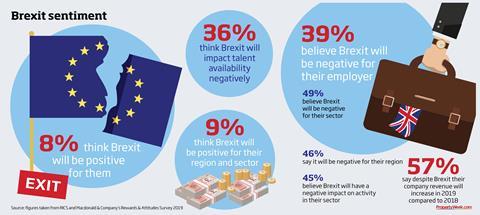When is no answer the most telling answer of all? When you ask the property industry about whether they have planned for Brexit.

A month ago, Property Week contacted 61 leading UK property firms and asked them about the UK’s impending departure from the EU. Less than a third responded, even after being prompted every week for four weeks.
There is no doubt that a huge element of Brexit fatigue has swept across not just the industry but the nation. But another reading of this mass refusal to comment on an event of such magnitude is that some of the great and the good of UK property are burying their heads in the sand. It is not hard to see why.
As Property Week went to press on Wednesday, MPs had voted down Theresa May’s withdrawal agreement, rejected a no-deal and were expected to vote for a delay to Brexit.
However, the EU warned it would need “a credible justification” before agreeing to any extension. So with just two weeks to go before 29 March, there is still little clarity as to what the future holds. Even the dreaded no-deal appears to still be on the table – regardless of the outcome of this week’s votes.
Yet, the suspicion is that many property companies have not planned for the many potential scenarios, presumably on the basis that they don’t believe they are going to happen. With the clock ticking, surely it is high time those who haven’t yet taken their heads out of the sand do so.

Property Week’s survey certainly paints a very mixed picture of their state of readiness right now. We asked companies how they were preparing for Brexit, how a no-deal scenario altered those preparations and whether or not they had any fears over the UK’s departure from the EU.
No comment
Of the 61 property-related businesses asked to take part in the survey, there were 30 leading commercial developers, including the UK’s largest real estate investment trusts (REITs), five of the biggest funds, 10 leading agencies, six property portals and estate agency groups and the UK’s top 10 housebuilders.
Only eight of the commercial developers and REITs had anything to say, along with one of the funds, five of the agencies and one of the property portals and estate agency groups. The most sturdily constructed wall of silence came from housebuilders, with every one of them refusing to comment or failing to respond.
Among the companies that did provide a response was Town Centres Securities (TCS), which claims its regional bias makes it immune to Brexit.
“TCS really doesn’t have a major exposure to Brexit given its regional UK base,” insists a spokesman.
However, TCS’s contention that companies that do not operate in London or the South East have less to fear from a no-deal does not tally with the government’s assessment, published last month, which warned that the regions would be more adversely affected by a no-deal.
Worst-hit areas
It said the worst-hit areas economically in a no-deal scenario would be: Wales, which would see its economy shrink 8.1%: Scotland, which would shrink 8.0%; Northern Ireland which would be down 9.1%; and the North East, which would suffer a 10.5% fall.
A counter-argument to TCS’s theory offered by other respondents is that, if anything, investors would flock to the safe haven of London, rather than risk their cash in the regions.

The failure of a single housing developer to respond to our survey is arguably more of a concern. Although they declined to speak to Property Week, a quick delve through the archives suggests the nation’s housebuilders are worried about Brexit, especially a no-deal.
In Galliford Try’s half-year results, published in the middle of February, the group stated: “We consider that a controlled departure under the terms of a withdrawal agreement between the UK and the EU will have no significant direct impact.”
However, the prospect of a no-deal would, added Galliford, have a “severe” impact. “If the UK leaves without a deal, the biggest impact we foresee is the effect on our markets, and on Linden Homes’ market in particular, of a potential severe decline in consumer confidence and economic activity in general.”
We can only guess whether Galliford’s view is shared by any of the remaining nine housebuilders that declined to respond to our survey. Some, such as Berkeley Group, have made noises about the need to bring an end to the political and economic uncertainties around Brexit in recent financial statements, but none wished to answer any questions about their state of readiness as the current 29 March deadline looms.
Of the eight leading commercial property groups that did respond, two of the UK top three had something to say – Landsec and British Land offered their thoughts, but SEGRO, the industrial giant, did not.

However, British Land refused to provide any detail of its preparations or answer questions about its fears concerning a no-deal. “We’ve been talking to suppliers, as part of normal practice, to ensure they have a plan to enable them to deliver our projects, but we don’t have much more to say on the subject, I’m afraid,” says a spokeswoman for the UK’s third-largest listed property company.
Landsec was somewhat more forthcoming, saying it had assessed risks to the business that may result from the UK leaving the EU, including a no-deal scenario, with reference to three distinct workstreams: construction, operations and portfolio management.
In a statement issued to Property Week, Landsec says: “In construction, the risks identified included the potential impact of tariffs on imported goods, workforce labour and skills shortages, delayed delivery of products and foreign exchange exposure.
“On operations, the risks included the availability of imported goods required to keep our buildings open and providing a safe and secure environment for our customers. The portfolio risks were more general and assessed as having limited impact on the group. In consultation with its customers and suppliers, the group has contingency plans to mitigate the risks identified within each workstream.”
Cautious view
John Burns, the outgoing chief executive of Derwent London, concedes that last November’s £250m private placement with eight institutional investors was brought forward partly because of concerns of the UK’s exit from the EU. However, he adds that his firm has signed more than £80m of lettings since the referendum in 2016. “We have been taking a fairly cautious view over the last few years,” says Burns. “On the development side, we’re always making sure materials are in place, but I wouldn’t say we’re stockpiling.
“To be honest, it’s all quite difficult to predict, so we’re just getting on with it. We did decide to go to the market with the £250m private placement last year, when we could have waited. I suppose we did it earlier partly because of Brexit. There was a slight Brexit thinking behind that.”
The UK’s two largest shopping centre groups were also prepared to talk about Brexit, and their preparations to date.
A spokeswoman for intu says: “The economic uncertainty caused by Brexit is the greatest area of concern as this is impacting inward investment into the UK. We are in conversation with all appropriate suppliers to ensure continuity of service.”
Meanwhile, David Atkins, chief executive of Hammerson, claims his firm has “carried out extensive due diligence and taken precautionary steps as necessary to ensure that we are as prepared for Brexit as we possibly can be”.
Atkins is one of many in the industry who do not foresee any significant detrimental effects arising from Brexit. However, he adds: “We urgently need clarity on Brexit to provide the stability that is vital for both business and consumer confidence.
It’s all quite difficult to predict, so we’re just getting on with it
John Burns, Derwent London
“Business leaders have stressed this since the outcome of the referendum. Without stability, boardroom decision-making is much tougher, and if uncertainty around Brexit continues, we will undoubtedly see more and more of an impact on UK businesses in 2019.”
Another retail specialist, NewRiver REIT, says it is confident in its ability to “handle any eventuality”.
Allan Lockhart, chief executive of NewRiver, says: “If there is an impact on consumer spending from an unfavourable Brexit outcome, consumers are likely to focus more on non-discretionary spend on Allan Lockhart, chief executive of NewRiver, says: “If there is an impact on consumer spending from an unfavourable Brexit outcome, consumers are likely to focus more on non-discretionary spend on Allan Lockhart, chief executive of NewRiver, says: “If there is an impact on consumer spending from an unfavourable Brexit outcome, consumers are likely to focus more on non-discretionary spend on everyday essentials, which is the area of the market where we are focused.
“Like any sizeable business, we would welcome an end to the current political uncertainty, which has put undue strain on so many.”

As for the leading agencies, BNP Paribas Real Estate, Colliers International, Knight Frank and Savills either failed to respond to the survey or refused to comment. However, the global top three did.
A spokeswoman for CBRE, the world’s largest property services firm, says it “has been running a robust programme of work with regard to its own Brexit preparations, which is focused on maintaining seamless business continuity for client services and its staff”.
However, the firm would not expand on what these preparations were.
Working group
Meanwhile, JLL formed a ‘Brexit working group’ after the 2016 referendum. “The group meets regularly to consider developments and ensure that our risk and business plans are sufficiently robust and adaptable as the potential realities of Brexit emerge,” says a spokeswoman for JLL.
“Despite the political and economic uncertainty, global allocations for real estate will continue to grow, with the UK a major target for international investors, and corporates continue to outsource real estate operations.
“There is a general consensus that Brexit and especially a no-deal Brexit could lead to a delay in the supply of goods, price increases and more generally an economic downturn, although the likely depreciation in the pound could attract overseas investors.”
George Roberts, head of UK and Ireland at Cushman & Wakefield, adds: “Like most businesses in the UK, we have taken prudent steps to ensure we are prepared for the UK’s planned departure from the EU. Having said that, the business community prefers certainty to uncertainty.
“While the government’s negotiations with the EU and domestically have clearly been complex, I don’t think anyone anticipated when this process began that so much at the political level would still be unclear at this late stage.”

Outside the big three, rapidly expanding Avison Young is also confident it can cope with any economic impact of Brexit.
Gerry Hughes, UK managing director at Avison Young, says: “As part of Avison Young, we are now able to take a much longer perspective on the market and as a principal-owned business, our focus is much more on long-term value creation across the entire global business.
“We take the view that we increasingly live in a world of city states and London is – and will remain – a truly global capital, regardless of Brexit. Due to these factors, we have no specific Brexit contingency plans, other than reflecting the uncertain market conditions in our financial planning as Avison Young.”
Peter Courtney, a director at Lunson Mitchenall, adds that the uncertainty surrounding Brexit makes it difficult to draw up contingency plans.
“When you ask a room of real estate experts about Brexit, I think it is safe to say that no one has the answer, and I can’t pretend we do either,” says Courtney.
“The only thing that is for certain is uncertainty and that makes it hard to put a plan in place. Instead, we are focused on being nimble and providing sound, practical advice to our clients while being aware and attentive to the political environment.”
Of all the comments from the property industry in response to our Brexit survey, one stood out more than any other. Brian Bickell, chief executive of Soho and Covent Garden investor Shaftesbury, has raised his head above the parapet to call for a second referendum to end the stalemate in parliament.
Cross-party approach
“London will continue to be Europe’s largest and only truly global city, regardless of Brexit,” says Bickell. “However, uncertainty is having a growing adverse impact on business decisions and investment.”
He warns: “Uncertainty won’t end until our long-term arrangements with the EU27 are settled. This is likely to take years as all there is so far is a vague, non-binding political declaration. A transition period is all well and good but what are we transitioning to?
“The mood of business is that no-deal would be the worst outcome for the UK and must be avoided, so a statesman-like cross-party approach is needed to find a way through.
London is – and will remain – a truly global capital, regardless of Brexit
Gerry Hughes, Avison Young
“A second referendum with choices of a deal recommended by parliament or remain – together with a declaration the UK will never hold another referendum about anything – might just heal the divisions.”
If Property Week’s Brexit polls over the past two and a half years are anything to go by, Bickell’s call for a second referendum will not go down too well with the majority of property professionals. However, he is suggesting a solution to the impasse the UK currently finds itself at.
As for the rest of the industry, the question is why so many firms have nothing to say on the biggest social, economic and political upheaval facing the UK since the Second World War.
Property professionals polled for RICS and Macdonald & Company’s Rewards & Attitudes Survey 2019 are clearly concerned.
Sitting in the corner with their eyes tightly shut, their hands over their ears singing tra la la is no longer an option.






























No comments yet